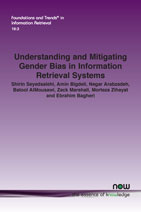Understanding and Mitigating Gender Bias in Information Retrieval Systems
By Shirin Seyedsalehi, Toronto Metropolitan University, Canada | Amin Bigdeli, University of Waterloo, Canada | Negar Arabzadeh, University of Waterloo, Canada | Batool AlMousawi, University of Calgary, Canada | Zack Marshall, University of Calgary, Canada | Morteza Zihayat, Toronto Metropolitan University, Canada | Ebrahim Bagheri, University of Toronto, Canada, ebrahim.bagheri@utoronto.ca
Abstract
Gender bias is a pervasive issue that continues to influence various aspects of society, including the outcomes of information retrieval (IR) systems. As these systems become increasingly integral to accessing and navigating the vast amounts of information available today, the need to understand and mitigate gender bias within them is paramount. This monograph provides a comprehensive examination of the origins, manifestations, and consequences of gender bias in IR systems, as well as the current methodologies employed to address these biases.
Theoretical frameworks surrounding gender and its representation in artificial intelligence (AI) systems are explored, particularly focusing on how traditional gender binaries are perpetuated and reinforced through data and algorithmic processes. Metrics and methodologies used to identify and measure gender bias within IR systems are then analyzed, offering a detailed evaluation of existing approaches and their limitations.
Subsequent sections address the sources of gender bias, including biased input queries, retrieval methods, and gold standard datasets. Various data-driven and method-level debiasing strategies are presented, including techniques for debiasing neural embeddings and algorithmic approaches aimed at reducing bias in IR system outputs. The monograph concludes with a discussion of the challenges and limitations faced by current debiasing efforts and provides insights into future research directions that could lead to more equitable and inclusive IR systems.
This monograph serves as a valuable resource for researchers, practitioners, and students in the fields of information retrieval, artificial intelligence, and data science, providing the knowledge and tools needed to address gender bias and contribute to the development of fair and unbiased information systems.
Understanding and Mitigating Gender Bias in Information Retrieval Systems
Gender bias is a pervasive issue that continues to influence various aspects of society, including the outcomes of information retrieval (IR) systems. As these systems become increasingly integral to accessing and navigating the vast amounts of information available today, the need to understand and mitigate gender bias within them is paramount. This monograph provides a comprehensive examination of the origins, manifestations, and consequences of gender bias in IR systems, as well as the current methodologies employed to address these biases.
Theoretical frameworks surrounding gender and its representation in artificial intelligence (AI) systems are explored, particularly focusing on how traditional gender binaries are perpetuated and reinforced through data and algorithmic processes. Metrics and methodologies used to identify and measure gender bias within IR systems are then analyzed, offering a detailed evaluation of existing approaches and their limitations. Subsequent sections address the sources of gender bias, including biased input queries, retrieval methods, and gold standard datasets. Various data-driven and method-level debiasing strategies are presented, including techniques for debiasing neural embeddings and algorithmic approaches aimed at reducing bias in IR system outputs.
The monograph concludes with a discussion of the challenges and limitations faced by current debiasing efforts and provides insights into future research directions that could lead to more equitable and inclusive IR systems. This monograph serves as a valuable resource for researchers, practitioners, and students in the fields of information retrieval, artificial intelligence, and data science, providing the knowledge and tools needed to address gender bias and contribute to the development of fair and unbiased information systems.
